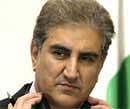
Responding to the two sets of dates proposed by India for the talks, Foreign Minister Shah Mahmood Qureshi said that February 25 is "not a bad date" for the talks.
Foreign Secretary Nirupama Rao had proposed February 18 and 25 as dates for the talks with her Pakistan counterpart Salman Bashir. The composite dialogue between the two sides was suspended in the wake of the 26/11 Mumbai terror attacks.
"I believe we should move forward. Common sense states that talks should be held as soon as possible," Qureshi said.
"What is important is that we start talking. Of course we feel that these talks should be the re-start of the composite dialogue and take it up from where we left off. After all, all the issues that both sides want to raise are included in the composite dialogue," he said in separate interviews to Geo news channel and the News daily.
"We have many outstanding issues on our agenda, like the Kashmir issue that India recognises. There is the waters issue on which there should be talks," he said.
"If you do not hold talks on these issues, the talks will not be beneficial. Do you want progress or just talks? We want progress and not talks for the sake of talks. We want meaningful and result-oriented talks," he said.
Qureshi was replying to a question on whether India would be willing to include issues like Kashmir in the upcoming parleys.
It was "really not that important" where the parleys are held, he said, adding Pakistan would approach the talks with an open mind.
Referring to the Kashmir, Qureshi pointed out that even India had started "quiet diplomacy with the Kashmiris".
At the same time, he said, the sharing of river waters is important because Pakistan "is an agriculture-based country and 90 per cent of our water is needed for agriculture".
Pakistan will also raise the issue of "strategic balance" in the upcoming talks, he said.
Following India's recent offer for holding talks, Qureshi chaired an inter-ministerial meeting yesterday to assess the proposal and to formulate Pakistan's response.
A statement issued by the Foreign Office after the meeting made it clear that Pakistan favoured the resumption of the stalled composite dialogue to resolve all outstanding issues.
Asked if India wanted the upcoming talks to focus solely on terrorism, Qureshi replied that Foreign Secretary Rao had told Pakistan's High Commissioner to India Shahid Malik that "all issues can be put forward and discussed".
"They can raise whatever issue they want and we will do the same. If we are to have a meaningful engagement, there should not be conditions. There will be no benefits if conditionalities are imposed. Conditions will prevent the dialogue from moving forward," he said.
In reply to a question on whether Pakistan would seek an assurance from India that it would not break off the talks if there was another Mumbai-like terrorist attack, Qureshi did not give a direct answer but said: "The terrorist incident in Mumbai caused a setback in ties. Such incidents are occurring in Pakistan almost every day and nationals of many countries are involved in attacks that kill innocent people.
"Have we snapped ties with these countries and stopped talking to them? We have not broken off ties with governments. Should we tackle this problem jointly or break off ties and strengthen the hands of forces who want just that to happen?" he added.
The objective of yesterday's inter-ministerial meet was to consult all stakeholders and discuss India's offer in the backdrop of the meeting between High Commissioner Malik and Foreign Secretary Rao.
Qureshi said he would share the outcome of the meeting with the political leadership and "then we will chart a way forward".
Pakistan has no concerns about the dates suggested by India – February 18 or 25 – and the talks could be held in such a manner that they did not clash with other programmes of the Pakistani Foreign Secretary, he said.
Asked about the progress made in the four rounds of the composite dialogue that began in 2004, Qureshi said: "It would not be correct to say there was only nominal progress or that the four rounds were not beneficial. I believe there was incremental progress and confidence-building measures were adopted on peace and security and Kashmir."